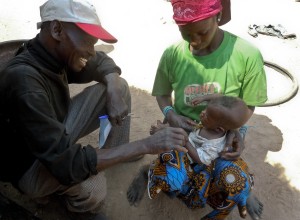Heroic health workers on the frontlines
|

In this country, diarrhea tends to be shrugged off as a mild nuisance, but in parts of the developing world, it can be a death sentence. Health workers like Salif in Mali know this all too well.
He recently treated a young boy, Sekou, who had refused to nurse or drink. On top of that, the one-year-old was also suffering from diarrhea and vomiting. Unsurprisingly, this perfect storm of conditions led to Sekou developing dehydration and severe malnutrition. By the time his parents reached Salif, Sekou's life was in danger. His eyes were sunken and he was very thin.
Luckily, Salif knew from his training with Save the Children to take baby Sekou to the health center immediately—a critical decision that likely saved the boy's life. While Sekou is not back to his playful self yet, he is home again, where Salif visits often to help him achieve a full recovery. He counsels Sekou's mother on breastfeeding and other nutrition practices that can make all the difference.
Salif is one of the many frontline health workers in the developing world who are working to treat childhood diseases like diarrhea in their own communities—even when doctors and hospitals are not within easy reach.
At Save the Children, we're trying to raise awareness about the critical need for more frontline health workers like Salif through campaigns like Every Beat Matters and the REAL Awards. Without them, millions of people would be cut off from the health care system entirely, and our incredible progress in slashing child deaths over the last two decades would be curtailed.
Take some time to read Salif's story and those of his health worker peers, and tell your member of Congress they need more support.
Babies like Sekou will thank you.














